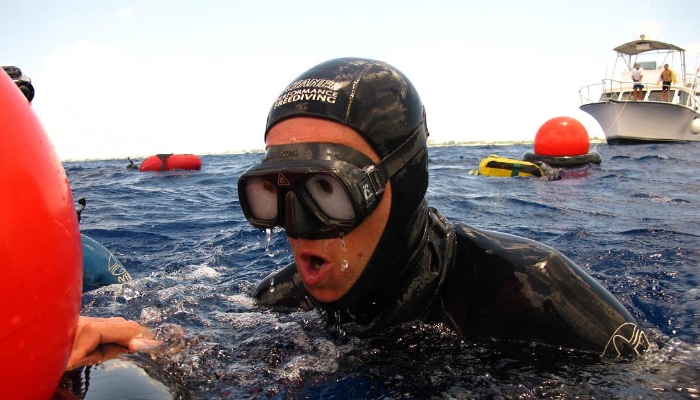Hyperventilation is any form of conscious or sub-conscious over-breathing. This means breathing more than the body needs for what it is trying to do. You wouldn’t breathe as if you were walking around when you are sitting on the sofa and you wouldn’t breathe as if running when you were walking. Hyperventilation can also be a chronic and subtle disease in the body, giving rise to a host of serious health problems. So why would anyone hyperventilate when they are preparing for a freedive?
When you hold your breath, rising levels of carbon dioxide give the body the first and most important trigger to breathe. This can be very uncomfortable and people think, incorrectly, that they are feeling the body ‘running out of oxygen’. Over-breathing reduces the levels of carbon dioxide in the blood (carbon dioxide levels are 150 times higher in the blood than in air so over-breathing can have a dramatic effect). As a result, if someone has over-breathed before a dive, then during the dive they have lower levels of carbon dioxide, which means that the dive can feel easier. Novice freedivers interpret this as ‘having more oxygen’ and so continue to hyperventilate as they believe it gives them more oxygen.
However, over-breathing (hyperventilation) is dangerous for freedivers for the following reasons:
- Having reduced the levels of carbon dioxide in the blood, the diver has taken away their primary urge to breathe and so they risk blacking out without any warning
- It constricts the arteries supplying blood to the brain, and in extreme cases can cause a blackout before the diver has left the surface
- It raises the heart rate, thus increasing the rate at which the body burns precious oxygen
- It can take the body from a relaxed (parasympathetic) state of being to a ‘flop, freeze, fight or flight’ (sympathetic) state
- It causes oxygen to bond more strongly to hemoglobin (the Bohr effect), reducing the ability of your body to use the oxygen when it most needs it.
Symptoms of over-breathing can include:
- Tingling in the extremities
- Feeling lightheaded
- A metallic taste in the mouth
- The fingers and thumbs cramping inwards
If you think you have hyperventilated in your preparation, then hold your breath for a few seconds and put longer pauses in between inhales and exhales. Always remember, you should breathe in a very relaxed fashion, just imagine you are falling asleep. If your buddy can hear you breathing then you are not relaxed!

